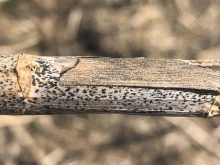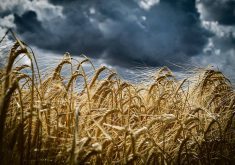STAFF |INDIANAPOLIS, INDIANA
They produce healthy oil for the consumer, but they don’t have healthy yields for the farmer. At least, that’s the coffee shop knock against Nexera canola varieties.
That’s a myth, company officials told Canadian farm reporters during a media tour of Dow AgroSciences world headquarters here Sept. 21.
“Agronomically our varieties continue to improve,” said Mark Woloshyn, Dow AgroSciences’ Nexera brand leader.
Not only do Nexera varieties yield as well as the top varieties, but farmers also receive a $1-per-bushel premium, he said.
Read Also

Think beyond the herbicide jug when dealing with wild oats
Wild oats are notoriously hard to manage, but one precision ag specialist offers some tips to growers.
In farmer-run, replicated trials conducted in 2009, Nexera varieties were the most profitable 94 per cent of the time, according to Woloshyn. Farmers netted about $17 an acre more, on average, growing Nexera, he said.
Dow says upcoming varieties will be even better. Until now, Nexera varieties have been open pollinated. But in 2011 two mid-to long-season Clearfield hybrids will be available. Two new open-pollinated Nexera varieties will be available next year too; one will be Clearfield and the other Roundup Ready. Current varieties NX4-106 RR, NX4-105 RR and NX4-204 CL will also be available.
In 2012, Dow AgroSciences will launch two new Roundup Ready Nexera hybrids.
“We’re excited and we’re investing,” said Woloshyn. “We think there is a lot of future in this canola segment.”
Nexera oil need not be hydrogenated, a process which increases unhealthy trans fats.
Gaining popularity
Nexera oil is gaining popularity with fast-food restaurants such as A&W, KFC and Taco Bell because it contains no trans fats, which lower “good” cholesterol and increase the “bad.” Regular canola is hydrogenated so it can be used in deep fryers longer, and because it gives processed foods a longer shelf life, but the process creates trans fats.
Company officials touted an announcement in June by Weaver Popcorn Company that it had converted all three of its microwave popcorn brands to Nexera oil. In so doing Weaver, which produces 30 per cent of the world’s popcorn,
slashed the level of saturated fat in its products 80 per cent and cut the total amount of fat in half. Weaver’s microwave popcorn is the first ever to receive a “heart-healthy” endorsement from the American Heart Association.
“We’ve removed a billion pounds of bad fats from the North American diet in the past 10 years,” said Tyler Groeneveld, Dow Agro- Sciences’ market manager for omega-9 oils. “That next billion pounds is not going to take 10 more years to happen.”
The biggest hurdle is taste, Groeneveld said, as food companies won’t change their recipes if flavour is compromised.
But the push for healthier food is getting stronger, said Groeneveld, because one-third of Americans are obese, another one-third are overweight, and one in eight kids has two or more risk factors for
heart disease.
“These are macro trends that are helping us shape our business,” he said.
Moreover, new U. S. Dietary Guidelines to be released in December will recommend replacing
MARK WOLOSHYN
DOW AGROSCIENCES
solid fats like palm oil and cottonseed oil with liquid oils. The guidelines will also recommend the daily allowance of saturated fat be reduced to seven per cent from 10.
“That bodes well for canola,” Groeneveld said.
Western Canadian farmers are in a good position to take advantage of the growing demand for omega-9 canola oil, Woloshyn said. With two new canola plants at Yorkton, Sask., there’s ample crushing capacity. And with so many acres of summerfallow from unseeded acres across the West this year, canola plantings
are expected to jump next year.
Another benefit of high-stability canola is that it doesn’t affect commodity-canola prices since it competes directly with soybean oil, Woloshyn said.














